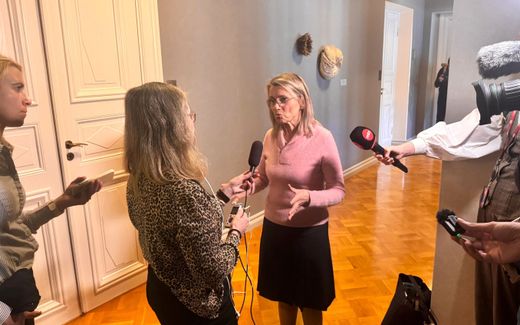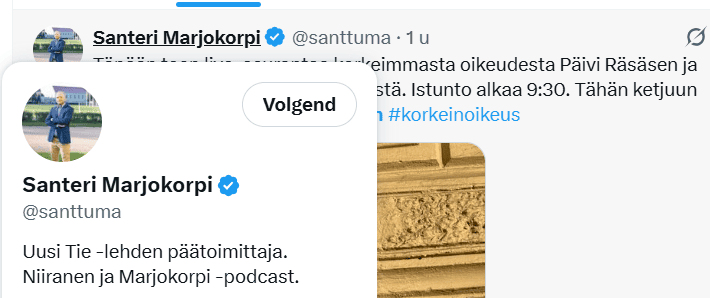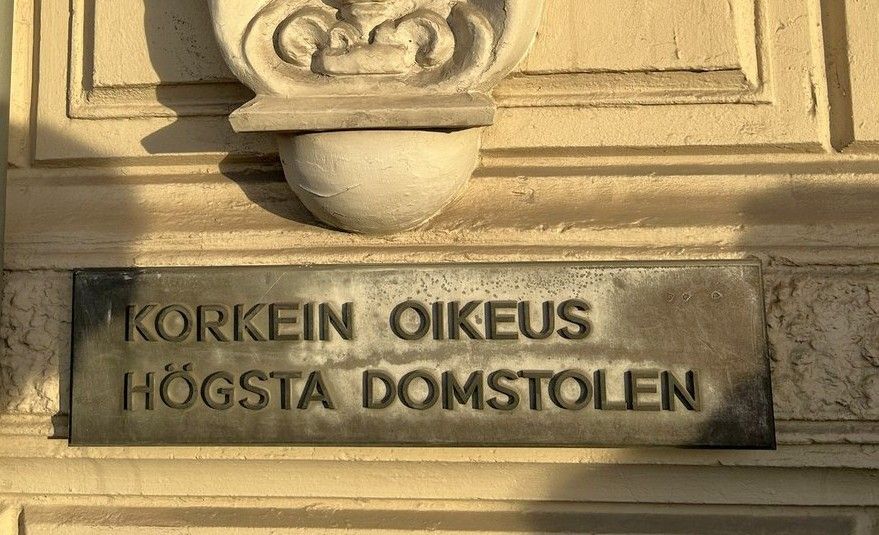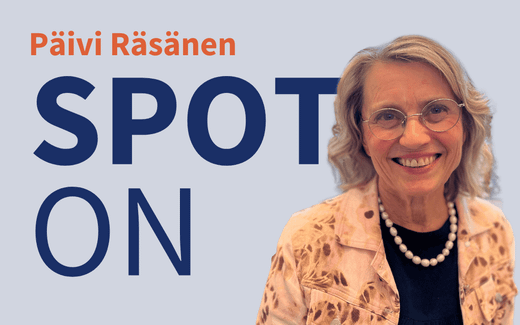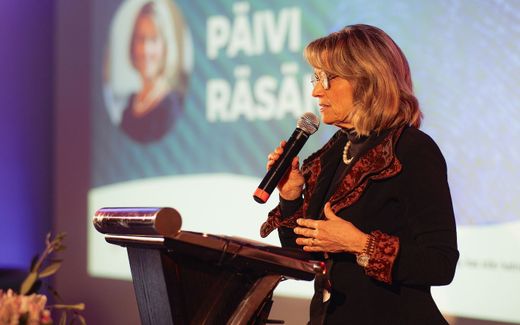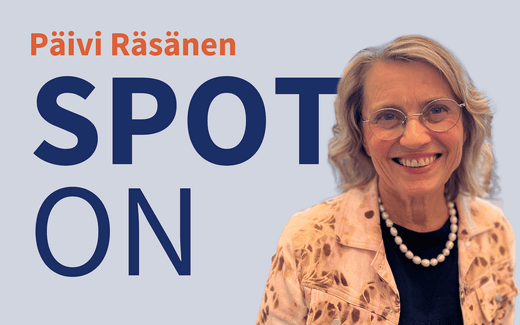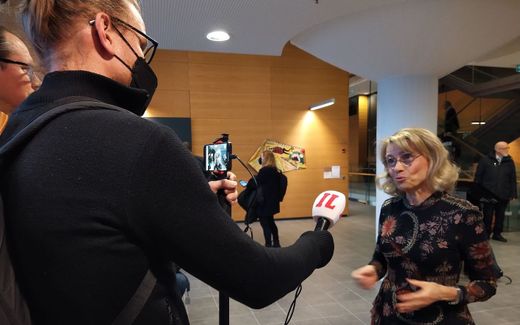Liveblog (closed): Päivi Räsänen stands trial again

Photo Canva.com, X, ADF International
Northern Europe
Finnish politician Päivi Räsänen stands trial in the Supreme Court along with Lutheran bishop Juhana Pohjola for allegedly insulting homosexuals. Follow the latest updates in this liveblog.
CNE’s correspondent Katariina Miettinen reports directly from the courtroom. (We use Central European Time (CET), which is one hour behind the clock in Helsinki, Finland.)
Analysis: In the final stage, prosecutor in Räsänen case focuses on a 21-year-old pamphlet
Read here an analysis of today's court session:
Päivi Räsänen: God has been so good in turning bad things to the good
Päivi Räsänen closes the press conference with a personal statement. The Finnish politician concludes that at the heart of this process is the question whether it is still permissible to present teachings related to the Bible, even when those teachings contradict the main ideology of society.

At the same time, she emphasises that she has gotten more joy than troubles through the court cases she has been through. “Many people, especially young people, have started to read the Bible after they learned about the process, she notices. “They pray to Jesus to come into their lives and found the promises to eternal life. And this has also happened to some people from the LGBT community.”
According to Räsänen, these examples show that it has not been in vain to defend freedom of speech and faith and speak publicly about the Biblical teachings. “God has been so good in turning bad things to the good”
A little thought experiment
In his concluding remark, Paul Coleman says that it was a surreal experience for him to sit through the various trials. He calls everyone to imagine what it would be like if the “state deployed all resources to review 30 years of what you said and then take a word and there, and say, why did you say this and that 20 years ago?” “None of us could withstand this sort of interrogation”, he expects. According to him, this little thought experiment shows the importance of this case. “Once hate speech laws are passed, all of our opinions could find itself before the court and the police and be seen as hate speech.”
Päivi Räsänen recalls police interrogations: I was shocked that something like this could happen in Finland
Päivi recalls that she had to defend her faith personally at the police station during interrogation. “There was a joke that I was doing Bible study at the police station”, she says. “I was shocked that something like this could happen in Finland, in a country with long roots in Christianity and rule of law.”
At the end of the interrogation, the police gave me two weeks time to apologise and delete my writings, she remembers. “I said that I would not apologise, because it was not my opinion but the Word of God. It was really absurd.”
Päivi Räsänen: Session was very different from earlier trials
Päivi Räsänen experienced this court session as very different from the Court of Appeal and the District Court. The prosecutors were much more aggressive in previous sessions, she notices.
At the same time, she still has the same confidence as during the other stages of the process. “I have a calm and confident feeling. I have felt all the time that this process has been in God’s hands and I trust that He will bring this to the end, whatever the result will be.”
Paul Coleman: If Päivi is convicted, it will deter many people
Paul Coleman explains that the determination of the prosecutor to charge Päivi is a “very effective way to get everyone else self-censoring”. It is hard to go after all the tweets that people send out, he says, but Päivi was a well-known person and the government has kept a record of much what she said over the years. If she would get convicted, this would be a strong deterrent for others in speaking out, Coleman says.
“Arguments against the tweet much weaker than against the pamphlet”
Matti Sankamo confirms that most of the court session was about the pamphlet today, and less attention went to the tweet. He explains that it is much easier for the prosecutor to criticise a 26-page long pamphlet than a tweet that focuses so much on the Bible. “It is easier to find material in a pamphlet than in a tweet that was basically just a picture of the Bible and two sentences. The arguments against the tweet are much weaker.”
What is at stake: Is this hate speech?
What is at stake revolves around the question whether Päivi's statements could be classified as hate speech, says attorney Matti Sankamo. That is what the prosecutor wants the court to assess. If this would be true, the statements would be illegal and have legal consequences. However, says Matti, this is not the way the Finnish "prohibition clause" should be interpreted according to European Conventions.
Paul Coleman (ADF): Stakes are very high
Paul Coleman from ADF International emphasises that the stakes are very high. “A conviction will have impact on all Christians in Europe”, he says. At the same time, it works the other way around too. “Acquittal will also be a strong signal to all people and strengthen the legal standard for everyone. It will have an impact beyond the borders.”
Attorney Matti Sankamo: Court session was quite unique
Matti Sankamo points out that this case was quite unique in the sense that the prosecutor did not ask a single question to the defendants. “I think it went very well. We were able to present our arguments well. And the prosecutor seemed surprisingly passive for a criminal case. They only argued on a very abstract level. So that was very interesting.”
Pohjola: Conviction will send dangerous signal to all Christians
After Räsänen, bishop Juhana Pohjola speaks. He stresses that he is called to preach the Bible and the natural law as a bishop. “The basic teaching of the pamphlet is widely shared among Christian churches”, he says during the press conference. “Any possible conviction will not only stigmatise me, it will send dangerous signals to all Christians. Such outcome would not contribute to building a free society based on the rule of law.”
Päivi Räsänen takes the floor
Päivi Räsänen takes the floor. She calls today a landmark day. "It was difficult, surreal, to see my faith, conscience and Bible itself placed on trial in a democratic nation", she says.
“My hope and prayer throughout this process have been that Finland would remain country a where everyone can hold their beliefs without fear.”
Press conference starts
In the press conference that just started, Päivi Räsänen, Juhana Pohjola, Matti Sankamo and Paul Coleman from ADF are present.
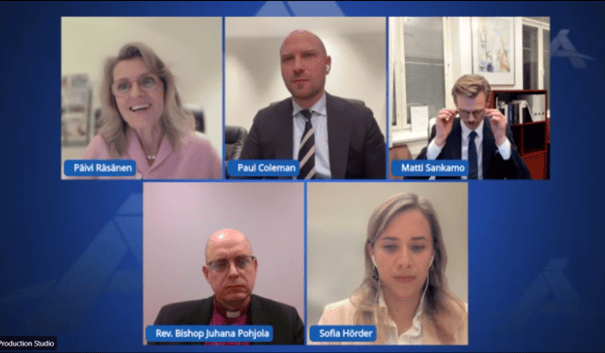
Press conference later this afternoon
The court session has now been finished. At 4 P.M. Päivi Räsänen and bishop Juhana Pohjola will hold a press conference together.
Judge: The proceedings are now concluded
The judge asks Päivi Räsänen whether her income has changed. That information is necessary because the prosecutors are demanding a fine. Päivi Räsänen denies that her income has changed and the judge concludes the proceedings.
Attorney criticises corporate fine
Anttinen criticises the demand for a corporate fine. He emphasises that there is no hatred or threat involved in the case and outlines the conditions required for imposing such a fine. Even if Pohjola were to be convicted, that alone would not justify a corporate fine, Anttinen says. After all, Pohjola made independent decisions as a member of the Luther Foundation.
Furthermore, the attorney stresses that imposing a fine would send a concerning message about interfering with religious freedom. Regarding the amount of the fine, he considers it unreasonable.
Attorney Jyrki Anttinen: Person may only be punished if act was a crime at the time
Jyrki Anttinen, the attorney of bishop Pohjola gets the floor. He refers to the principle of legality in criminal law. The Finnish Constitution states that no one shall be considered guilty of a crime for an act that was not defined as a crime at the time it was committed. In other words, a person may be found guilty of a criminal offence only for an act that was explicitly punishable by law at the time of its commission.
Furthermore, Anttinen says that the Finnish criminal code must be interpreted consistently with the foundational principles of international treaties. “The prosecutor has failed to respect fundamental legal principles.”
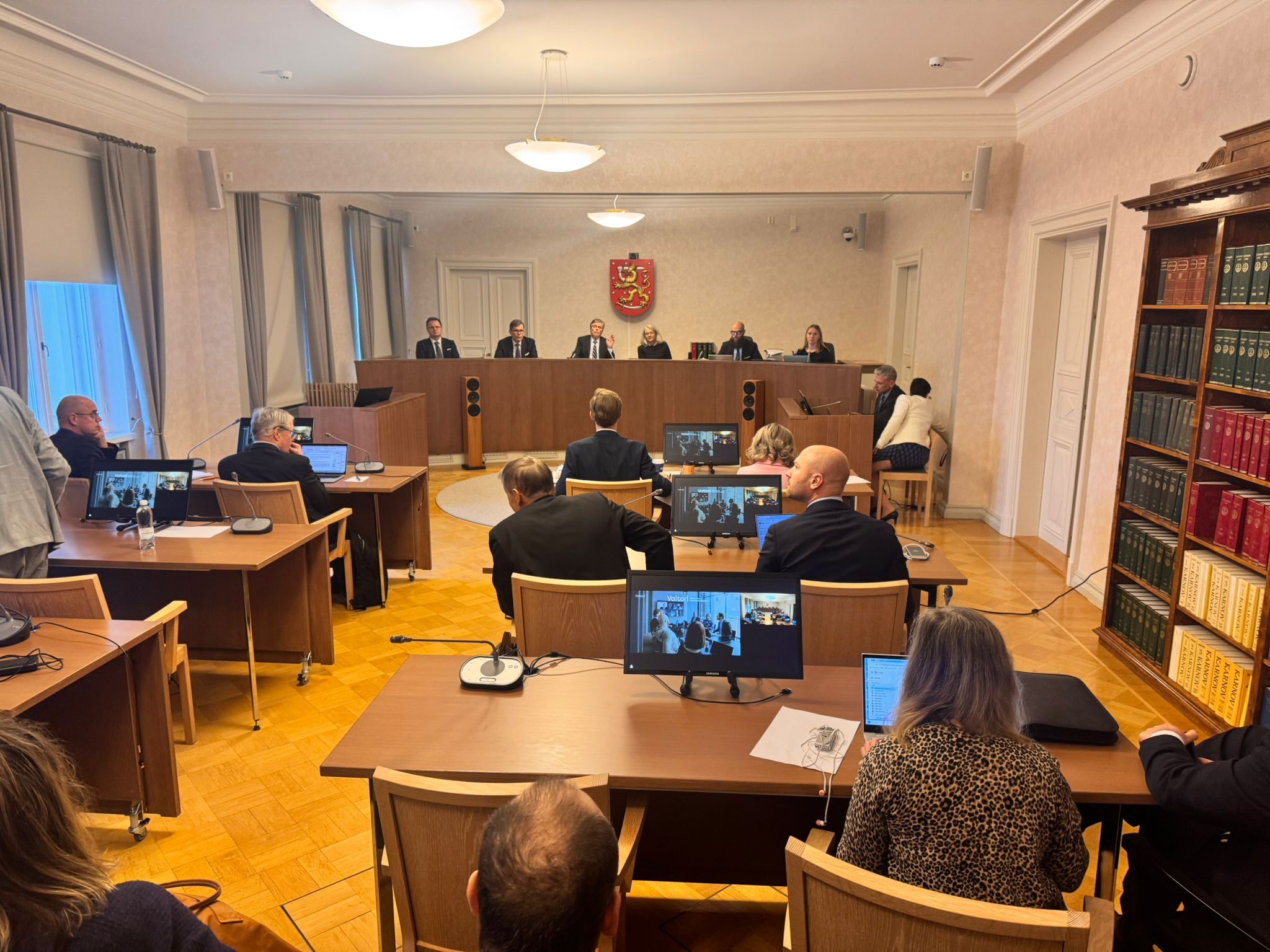
The attorney points out that the pamphlet was about religious views. These views may be viewed as offensive, but they are not inherently intended to offend.
Anttinen notes that if the prosecutor’s interpretation were accepted, it would constitute extensive and unpredictable use of public authority.
He also refers to the Constitutional Law Committee, which ruled that “the dissemination of a religious message is an activity specifically protected under constitutional provisions safeguarding freedom of religion and freedom of expression.”
“There will always be debate about homosexuality”
In his closing statement, Räsänen's attorney Matti Sankamo stresses that freedom of religion is protected by law. This means that his client has the right not to be compelled by the state to share his faith.
He asks whether the authorities have not violated their duty of neutrality. Instead of staying neutral, the prosecutor has interpreted the Bible and challenged Räsänen's interpretation of Scripture.
The words “shame” and “sin” originate from the Bible and therefore cannot be interpreted merely in the sense of everyday language.
Regarding the Pride event, Sankamo says: No movement has an exclusive right to represent any particular minority. The event has sparked debate both for and against within several political parties.
In Finland, there has been political debate about attitudes toward homosexuality, and that debate continues, and will continue in the future. Member of Parliament Päivi Räsänen has participated in such a debate as part of her public duty. She should not be curtailed in doing that.
It is true that the state has changed its view on marriage, in the meantime. But this should not make Räsänen’s opinion a criminal act. The hate speech provision (“incitement clause”) is not meant to serve as the right of the ideological victor.
“Päivi’s message has been severely distorted”
Matti Sankamo criticises the framing of Päivi’s message in public. He says that she has even received phone calls asking whether she supports the killing of groups of people. According to Sankoma, Räsänen enjoys an enhanced protection of freedom of expression and the duty to participate in public debate as an opposition politician.
Furthermore, he stresses that the underlying message of the pamphlet is clear: according to the Christian view, every human being is equally valuable, regardless of sexual orientation. “My client firmly stands by this principle.”
Sankamo adds that the pamphlet is not propaganda and does not have the intent of insulting or degrading anyone. “Its context, the time it was written, and its overall wording together exclude any unlawfulness”, he says. “Quoting short excerpts without their original context undermines the defendant’s right to a fair trial.”
Matti Sankamo: Case does not need to focus on discrimination
Matti Sankamo, Räsänen’s lawyer, takes the floor again. He refers to the European Convention on Human Rights, which has never been applied to support charges.
Furthermore, he says that the case does not need to focus on discrimination issues, because the legislator has taken a clear stance. “In cases involving discrimination—reflecting Finland’s strong societal traditions—freedom of expression is central and must be given proper interpretation.”
According to Matti Sankamo, the clause in Finnish law that speaks about incitement should not be used against “Finland’s strong traditions of openness and freedom of expression”. He points out that the threshold for criminal liability has been set high.
“The pamphlet must be understood in its context of opposition. It was written over 20 years ago for teaching purposes, not for national distribution or public campaigning.”
The prosecutors demand deletion of materials and fine
The prosecutors argue that Räsänen wrote the pamphlet as an expert. They say that an expert cannot invoke freedom of expression when providing false or misleading information. As a doctor in 2004, Räsänen must have known that homosexuality, as such, is not a psychosexual developmental disorder, they argue.
The prosecutors furthermore assert that Räsänen must have understood in 2004 already that her statements in the brochure were offensive to homosexuals. And she should have seen at least by 2010 that her statements were unlawful.
According to the prosecutors, religious freedom cannot justify “degrading homosexuals”. This right is not unlimited, they claim. The Finnish constitution speaks about the prevention of discrimination, which is, the prosecutors say, a legitimate ground to limit religious freedom. “Belief in equality takes precedence over the right to practise religion in a way that demeans others.”
The prosecutors point out that the Supreme Court has held that freedom of religion and conscience does not protect all actions merely because they are based on a person’s faith.
Political
And even though the pamphlet was not a political statement when it was written, Räsänen made it political when she linked to it from her personal website, the prosecutors say. Furthermore, they blame Räsänen for not distancing herself from her statements until today.
The prosecutors also blame Pohjola for being aware of the content of the pamphlet and still publishing it. He chose not to remove it from circulation, they say.
Fine
When it comes to Räsänen’s tweet, the prosecutors acknowledge that her intention may have been criticising the church, but in doing so, she insulted the LGBT community, they say. The prosecutors argue that religious interpretations of these words are irrelevant to the case. “The language must be interpreted according to its ordinary meaning.”
The prosecution demands the deletion of the materials, namely the tweet and the brochure. Furthermore, they demand a corporate fine of 10,000 euros.
Pamphlet written in 2004
The debate in the courtroom concentrates on the pamphlet that Räsänen wrote in 2004 for the Luther Foundation Finland. It was published as number 27 in a series of 33 booklets about Christian life in this world. On the foundation's website, the brochure is downloadable in English in PDF format at this moment.
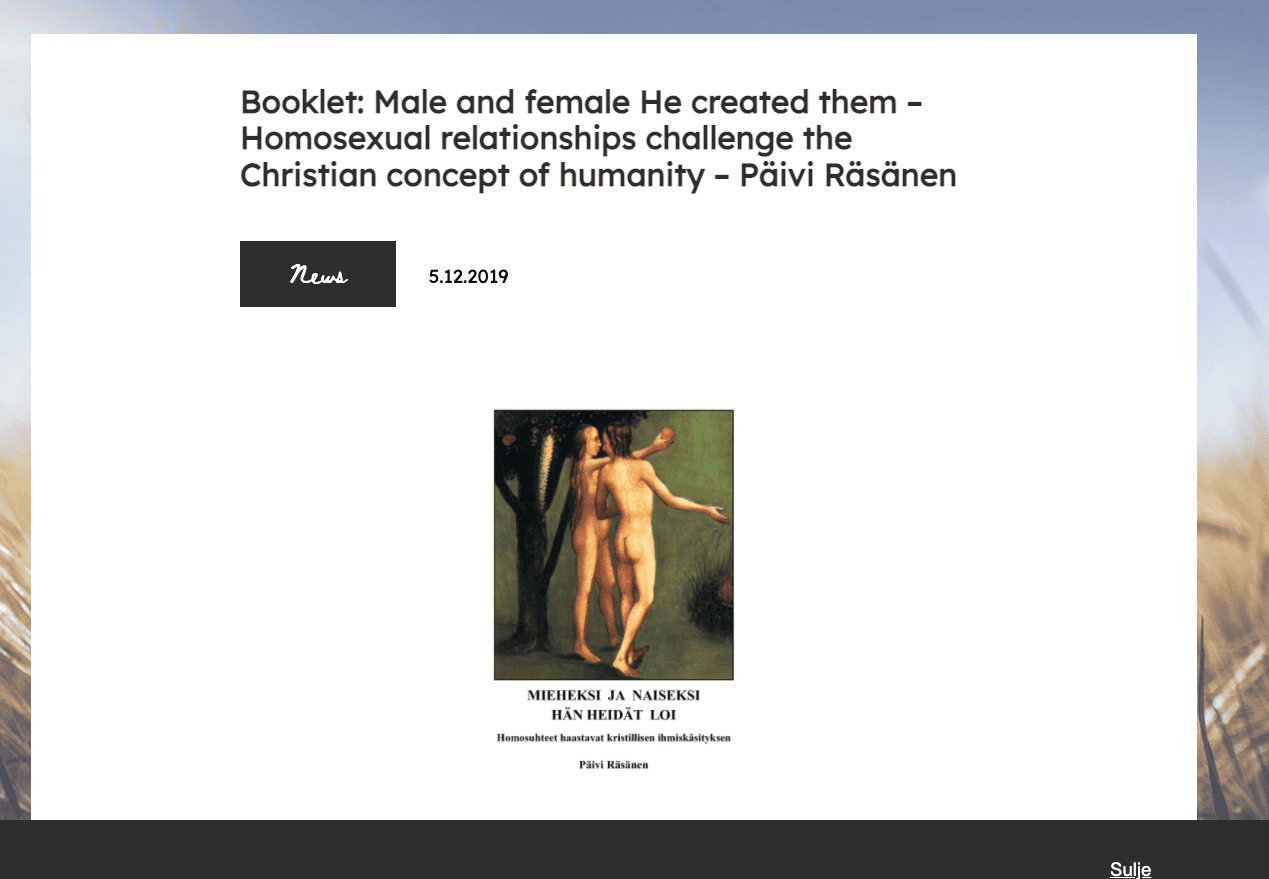
According to bishop Pohjola, it was circulated in limited circles originally, but published on the internet in 2007. Räsänen said, she published the link to the internet version again in 2019, when the debate started. In terms of the content, she re-wrote the brochure though in 2015 already, since she thought that much of the content was outdated by then.
Prosecutors get the floor
The prosecutors set out the counts. They say that the matter concerns the legal assessment of the content of the pamphlet and argue that it should be evaluated as a whole. They say that the message of the pamphlet is deliberate and that there is no ambiguity about Räsänen’s attitude toward homosexuals: homosexuality is described in the text as a form of brokenness.
The prosecutors set out the counts. They say that the matter concerns the legal assessment of the content of the pamphlet and argue that it should be evaluated as a whole. They say that the message of the pamphlet is deliberate and that there is no ambiguity about Räsänen’s attitude toward homosexuals: homosexuality is described in the text as a form of brokenness.
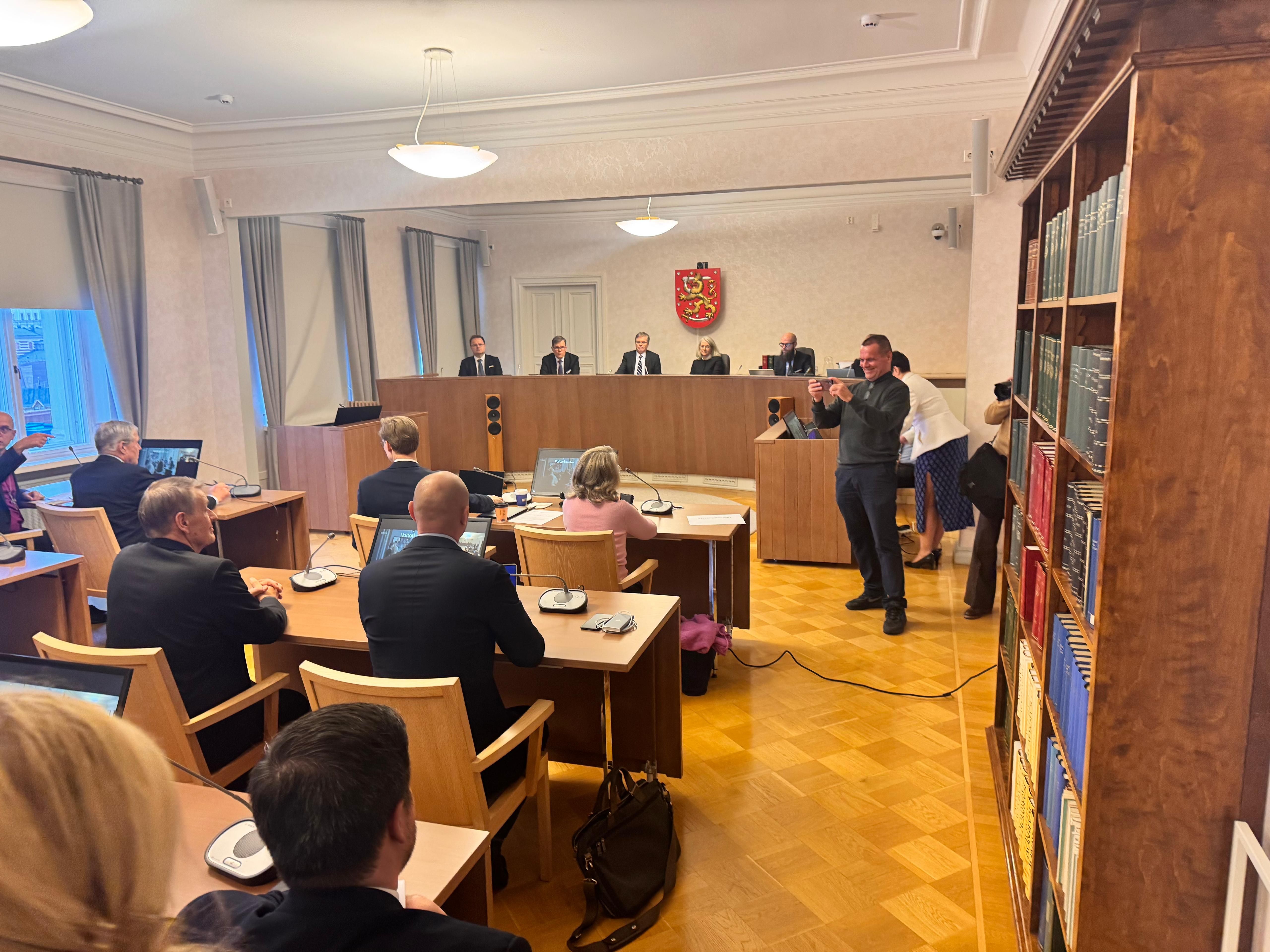
They also point out that the pamphlet was available to everyone and that Räsänen’s claim that it was only for a limited audience is thus not true. Furthermore, the prosecutors say that interpretations possibly held by conservative Christians are not legally relevant.
According to the prosecutors, Räsänen’s expert position as a medical doctor gave her a sense of authority. Thus, readers should be able to trust her statements.
Court session about to begin again
The court session is about to start again. Next will be the closing statements, after which the proceedings will conclude.
International media publish about court session
Quite a few foreign media publish about the court session. As far as we can see, it is mainly the Christian media that have interest for this. The Norwegian newspaper Dagen sent their senior commentator Espen Ottosen to Helsinki.
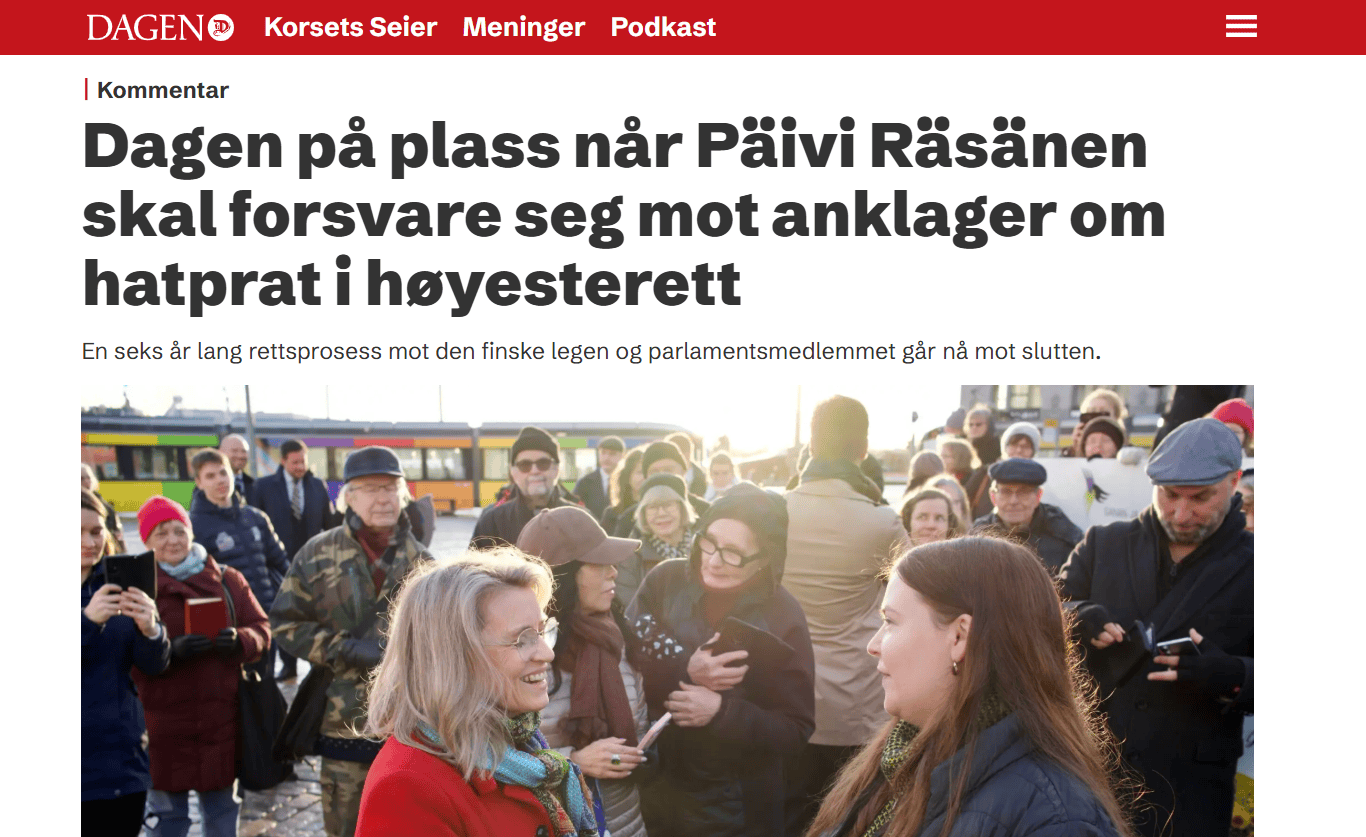
Also the Swedish Dagen published an article.
Protestante Digital published an overview article in Spanish, together with Evangelical Focus.
The Christian magazine World from the US not only published an article, but also released a podcast about the case. Also CNE contributed to this podcast.
Päivi speaks with the press
Outside of the court room, Päivi Räsänen speaks with the press. “If I were convicted, this would be censorship”, she says.
To the question how she felt about arriving at the court, she says that it is “exiting” to come to the Supreme Court. “I am very confident. My calling is to defend freedom of speech. Christians must be able to speak publicly about their views, and I defend that. This is where I stand, and I cannot do otherwise.”
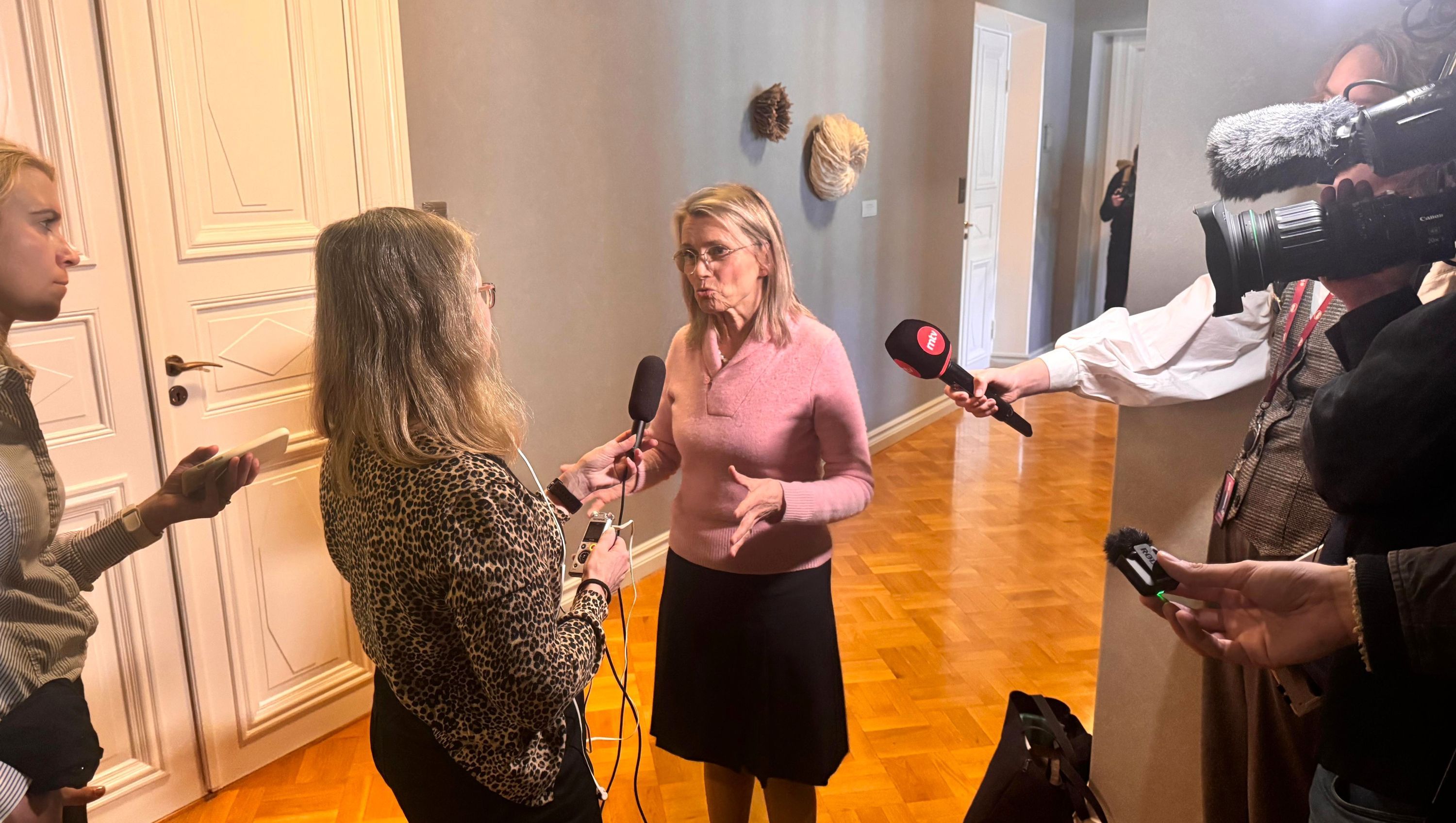
The break starts
The judge pauses the session until 1 P.M. Finnish time, which is 12 P.M. CET.
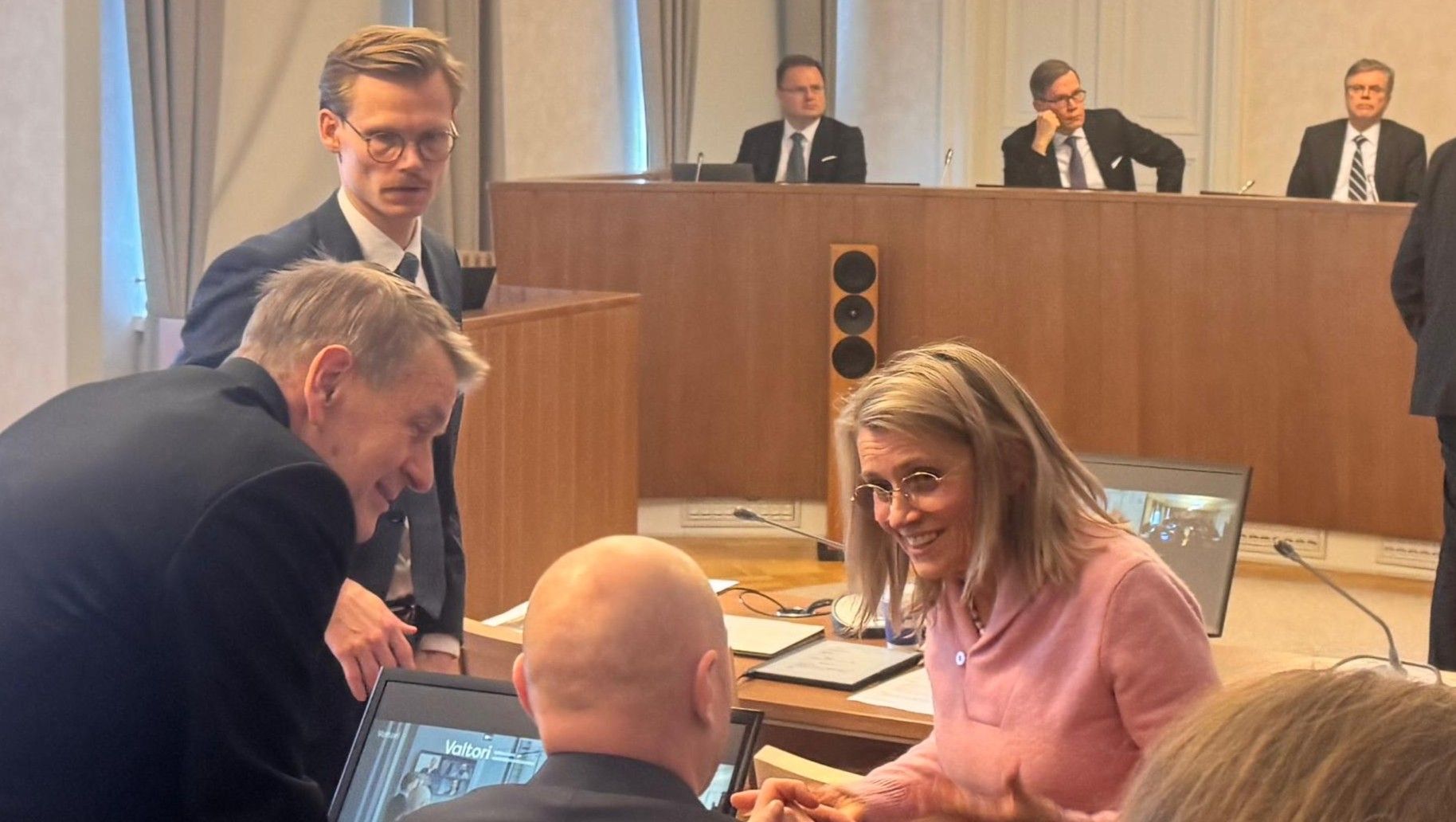
Päivi Räsänen: It felt like I had to defend my faith
Päivi Räsänen wants to raise a point concerning the incitement legislation under which she is charged. She says she has always been committed to ensuring that no group is discriminated against, and that it never occurred to her that her own writing could be targeted under this law.
When asked by her lawyer Sankamo, she tells the judge that she was questioned about her theological beliefs and had the feeling that she had to defend her faith. “During police questioning, we reviewed passages from the Bible, and I was asked to read and explain Romans. It was a deeply theological, Bible-based discussion. At the end of each session, the police asked me to consider giving up the writings, but I stand by them.”
Bishop Pohjola gets the turn to speak
After Päivi Räsänen, it is Pohjola's turn to speak. He is also questioned by his lawyer, Jyrki Anttinen.

The lawyer first asks to describe the Lutheran foundation of which Pohjola is the director. Answer: The foundation is there to support the congregations in the mission diocese. The activities must be based on the Bible and the Lutheran Confession.
Concerning marriage, he finds it important that people act according to the Christian perspectives. To help people with that, he personally asked Räsänen to write the pamphlet to take a position, in a time that many things were in discussion. And Räsänen agreed to this.
Later on, this booklet was (together with many other booklets) uploaded in PDF on the internet.
Päivi Räsänen about her tweet: I was worried about credibility of the Church
Requested by lawyer Matti Sankamo, Päivi Räsänen explains more about her tweet in 2019 in which she warned the church against supporting Pride. The Church Administration, with the Archbishop’s blessing, had decided to support the event, also financially, she says.
Räsänen points out that she was concerned about the credibility of the church. “Pride is in conflict with the Bible. It undermines trust. This was the reason I felt it was my duty to address the matter and raise it publicly. I appeal to the fact that, as a council member, the Church Act acknowledges faith based on the Bible. All teaching in the Church must be evaluated according to the Bible.”
When the judge asks her in which position she was when she wrote the tweet, she replies that she wrote it “primarily as a Christian and as a politician”.
Räsänen denies allegation of connecting homosexuality and sexual abuse
Päivi Räsänen is also attacked for a passage in the booklet that speaks about sexual experimentation in schools. Some accuse her of saying that adult homosexual men are paedophiles. She strongly denies that allegation.
“I do not associate adult homosexual men with pedophilia; that is not true. The problem also concerns men who target girls. This creates a pathway for sexual abuse in which adult men can more easily make contact with young boys. I am referring to a minority. It equally concerns girls targeted for sexual abuse. Children can be enticed at a very young age into homosexual experimentation, where the perpetrator may be an adult man. I have not used the strong term “pedophilia.””
According to Päivi Räsänen, the intent of the whole pamphlet was to defend the Bible, that says that homosexuality is against God's will, but also that grace belongs to everyone. "I emphasise that God loves homosexual people and wants to include them in the Gospel."
Päivi Räsänen: I never said that homosexuality must be eradicated
Päivi Räsanen is questioned by her lawyer Matti Sankamo. He asks her about the message of the pamphlet and its audience. She says that she was requested to write a booklet about certain themes. She understood that it was intended as educational material for churches. “Because I am known as a Christian, I was asked to write it.” Räsänen says she doesn’t remember any criticism at the time.
She adds that it was a surprise for her that the booklet was published online. When she learned in 2019 that the pamphlet was part of a police investigation, she posted a link to the booklet on her social media to defend herself. “I want to emphasise that at the time, I was a politician in the opposition. A politician has both the right and the duty to be open.”
Räsänen also says that she has never said that homosexuality is something that must be eradicated. About the claim that she believes that homosexuality is immoral: “Before God, we are all on the same level; we are all sinners. The basic goal is to strengthen trust in the Bible. The starting point is not to accuse people of immorality. The goal is that everyone can trust the Bible as God’s word.”
Lawyer Sankamo also asks her about her opinion on homosexuality today. “Research and perspectives have changed”, Räsänen says. “At the time, I consulted contemporary sources on which the writing was based. The pamphlet was written in two evenings; it is not a significant text. Later, my spouse and I wrote a new work which I have distributed. The pamphlet has not been in use by me personally.”
Räsänen also stresses that she is oopen to scientific research. “In my writing, I discuss the individual’s personal choices. I wanted to convey understanding and compassion to people. I also note that the term “psychosexual concept” is not considered derogatory even today. We have the World Health Organization’s definitions of psychosexual health disorders.”
Päivi Räsänen during earlier interview: Keep testifying your faith while you can
Read the interview here:
Lawyer of bishop Pohjola: Bishop did not know content of his booklet was unlawful

The attorney of bishop Pohjola, Jyrki Anttinen, points out that the booklet contains a lot of terminology. He stresses that Pohjola was not aware that his publication contained anything unlawful.
Matti Sankamo about Räsänen’s tweet: Should be connected to the proper context
Sankamo points out that Räsänen’s tweet against the support of the state church for Pride was published publicly on Twitter. Therefore, he argues, the prosecutor has been able to read the tweet in its context: Pride. Sankamo says that the discussion should not revolve around punished people for a poor choice of wording.
According to the attorney, the issue in question is about the image of the Bible that Räsänen attached to her tweet. After all, Räsänen is prosecuted for the text in the picture. “The text alone would not have brought us to the Supreme Court.” In other words, he argues that the prosecutor charges Räsänen for quoting the Bible itself.
Sankamo adds that the target audience of the tweet was the church leadership. “The church is a societal influencer and must be open to criticism. This cannot, by a stretch of logic, be redirected toward a population group.”
Matti Sankamo: Booklet says that “all people are equal”
Attorney Sankamo says that the question is whether the pamphlet asserts the claims that the prosecutor alleges it contains. He argues that the text is an opinion piece with which Räsänen participated in a socially important discussion.
The term “homosexual disorder” that is in the text, appears still in literature, he argues. When the booklet was written, this was a usual term, and other textbooks from that time use it as well. The same applies to the words “homosexuality is a sexual deviation”.
According to Sankamo, the prosecutor falsely claims that the booklet is written against homosexuals. Instead, he says, its message is that all people are equal, and all people are created by God. These words are in the booklet itself. “The idea that some people are not equal is the prosecutor’s view.”
Räsänen's lawyer takes the stage
Räsänen's lawyer Matti Sankamo answers on the accusation by the prosecutor:
The pamphlet [from 2004, ed.] was not intended for public discussion. The court is reviewing why it has come into the public domain. It has not sparked criticism. Later, during personal hearings, this will be examined further. To the extent that criticism has arisen, it has occurred later and has concerned the pamphlet itself rather than its content.

The final statement reviews the significance of the opposition’s position. The defendant could reasonably assume there was no reason to suspect a crime, regardless of the prosecutor’s opinion on the pamphlet.
On November 4, 2019, the National Prosecutor said a preliminary investigation would be conducted. Räsänen has defended her reputation through online publications. The publications clearly reference the National Prosecutor. Citizens can see for themselves what the pamphlet contains. The publication was intended for an audience for whom it was not originally written.
National prosecutor: Freedom of speech does not include homosexuality
National prosecutor Mikko Männikkö says that freedom of speech includes the right to express severe criticism, such as on immigration. However, this case is about homosexuality, something that cannot be influenced or changed. Therefore, this is different, he argues.
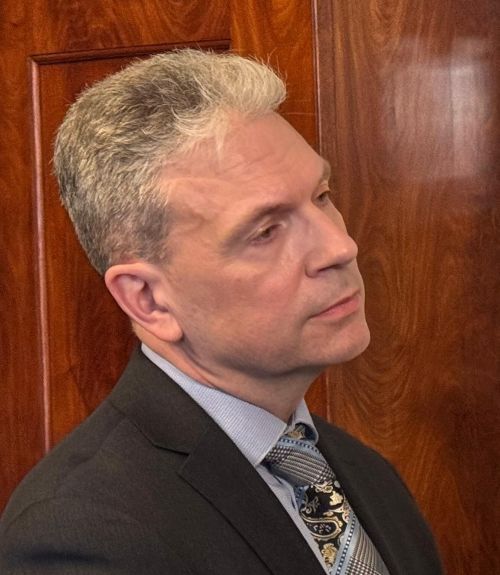
The prosecutor shows six slides that show that the charge is about an online publication of a pamphlet. The content is available online, and everything was published with Räsänen’s permission, he says. He adds that the removal of the document has been requested. The prosecutor points out that bishop Pohjola was responsible for the published writing.
The prosecutor also argues that the target audience of the booklet was broad. Not only people from the church could read it, but everyone, because it was published online. Another aggravating fact, the prosecutor says, is that Räsänen expressed these views as a medical doctor, and she should have examined all sources from which relevant facts could be derived.
Bishop Juhana Pohjola is on trial with Päivi Räsänen
Päivi Räsänen is not the only defendant in this court case. She stands trial with the Lutheran bishop Pohjola. Pohjola was responsible for the booklet in which Räsänen set out her views on homosexuality in 2003. For this, he is being prosecuted.
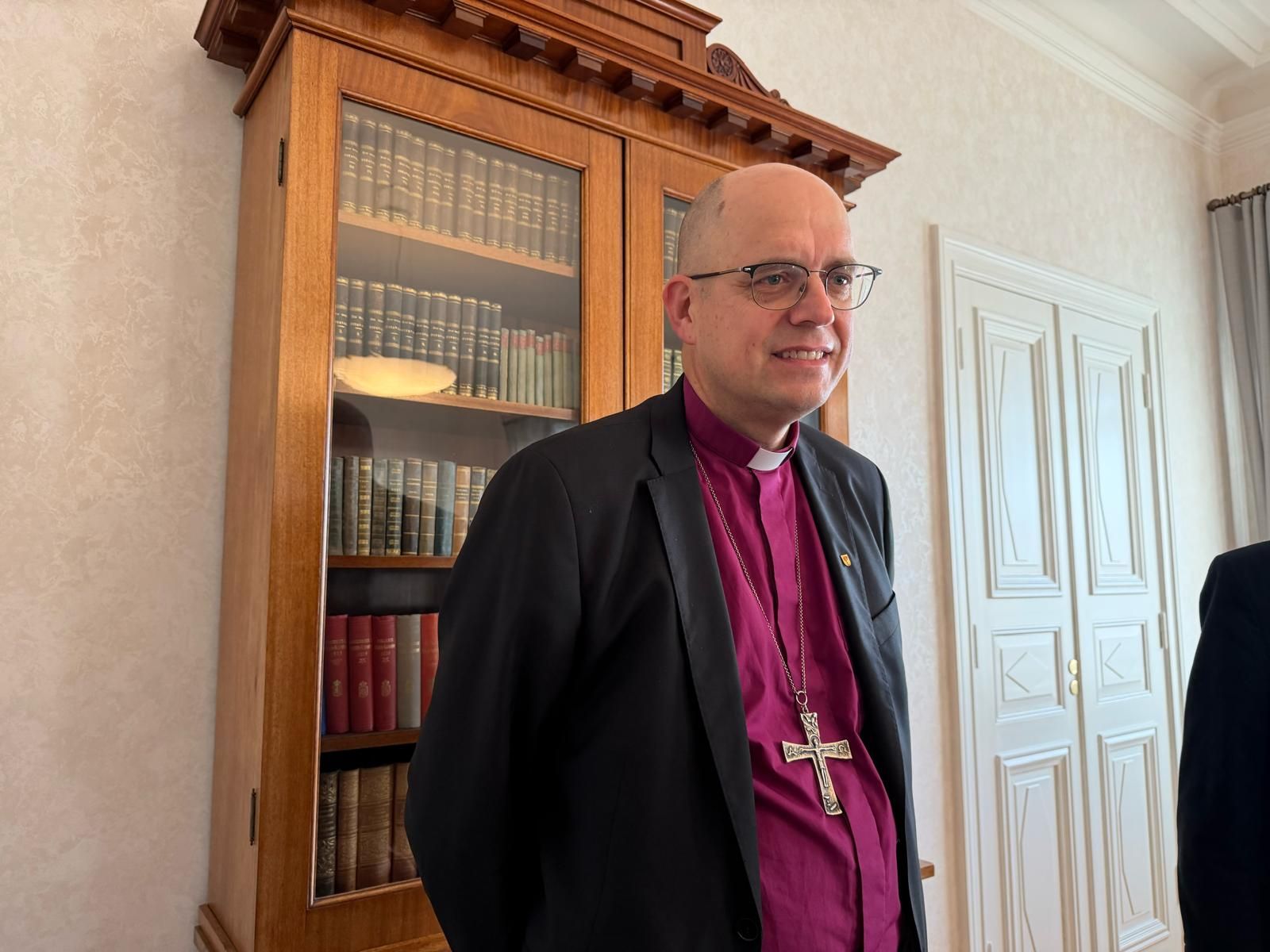
An impression of the court room
ADF International, the organisation that legally supports Päivi Räsänen, shares an impression of the court room on X.
The trial has started.
— ADF International (@ADFIntl) October 30, 2025
WATCH: Inside the court room: pic.twitter.com/4atK9JSX6a
The hearing starts
Päivi Räsänen and her lawyer Matti Sankamo are sitting in the courtroom. The hearing starts with the judge reviewing the parties involved. The schedule of the day is discussed, together with the offences and the court process up till now. Both Räsänen and the prosecutor will given the opportunity to make oral statements.
Before the session starts, the press gets the opportunity to take pictures. As on the earlier occasions, there is much interest of the media in Räsänen's court case.
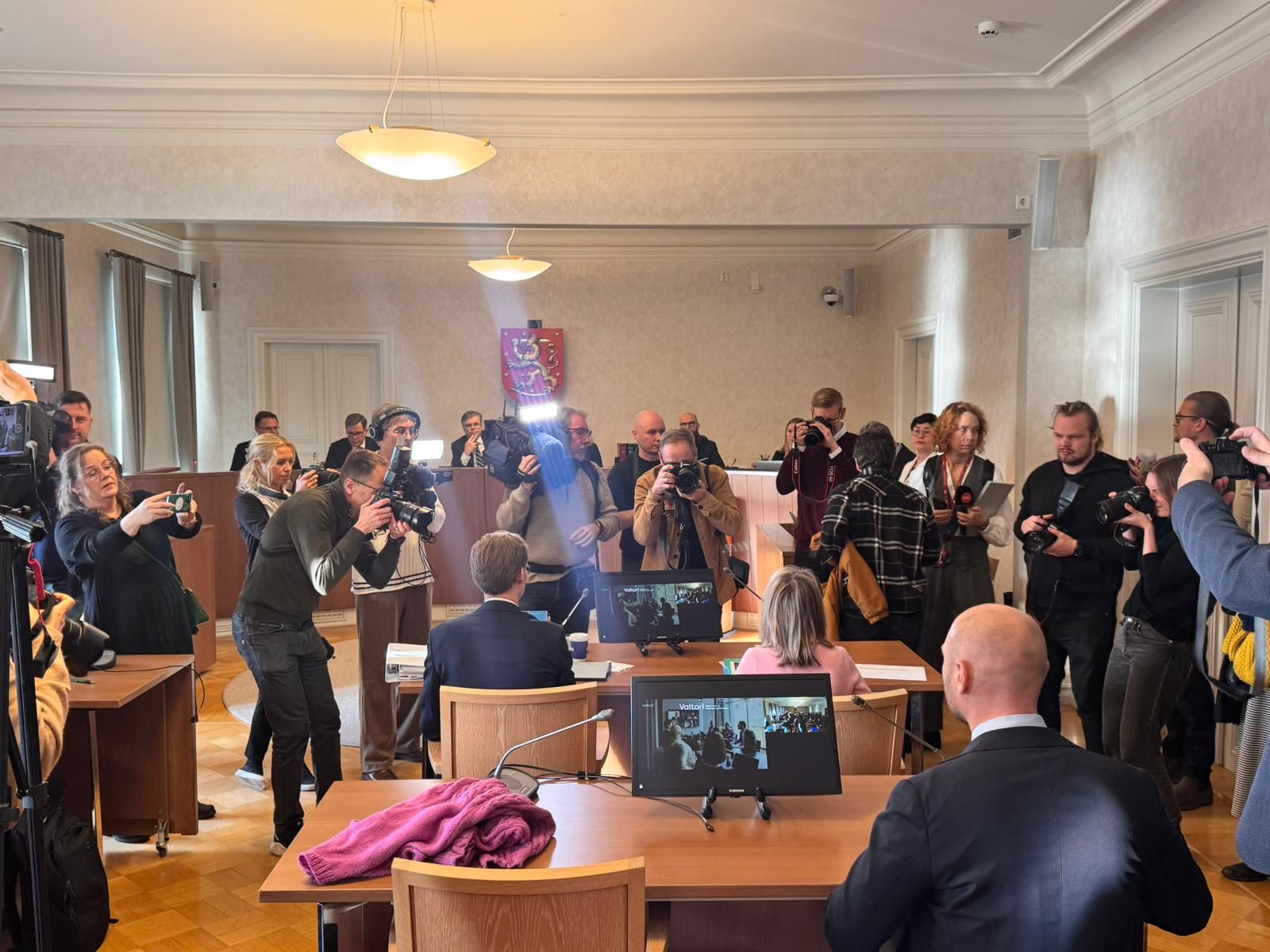
The public prosecutors are interviewed by the press
The public prosecutors get interviewed by the press.
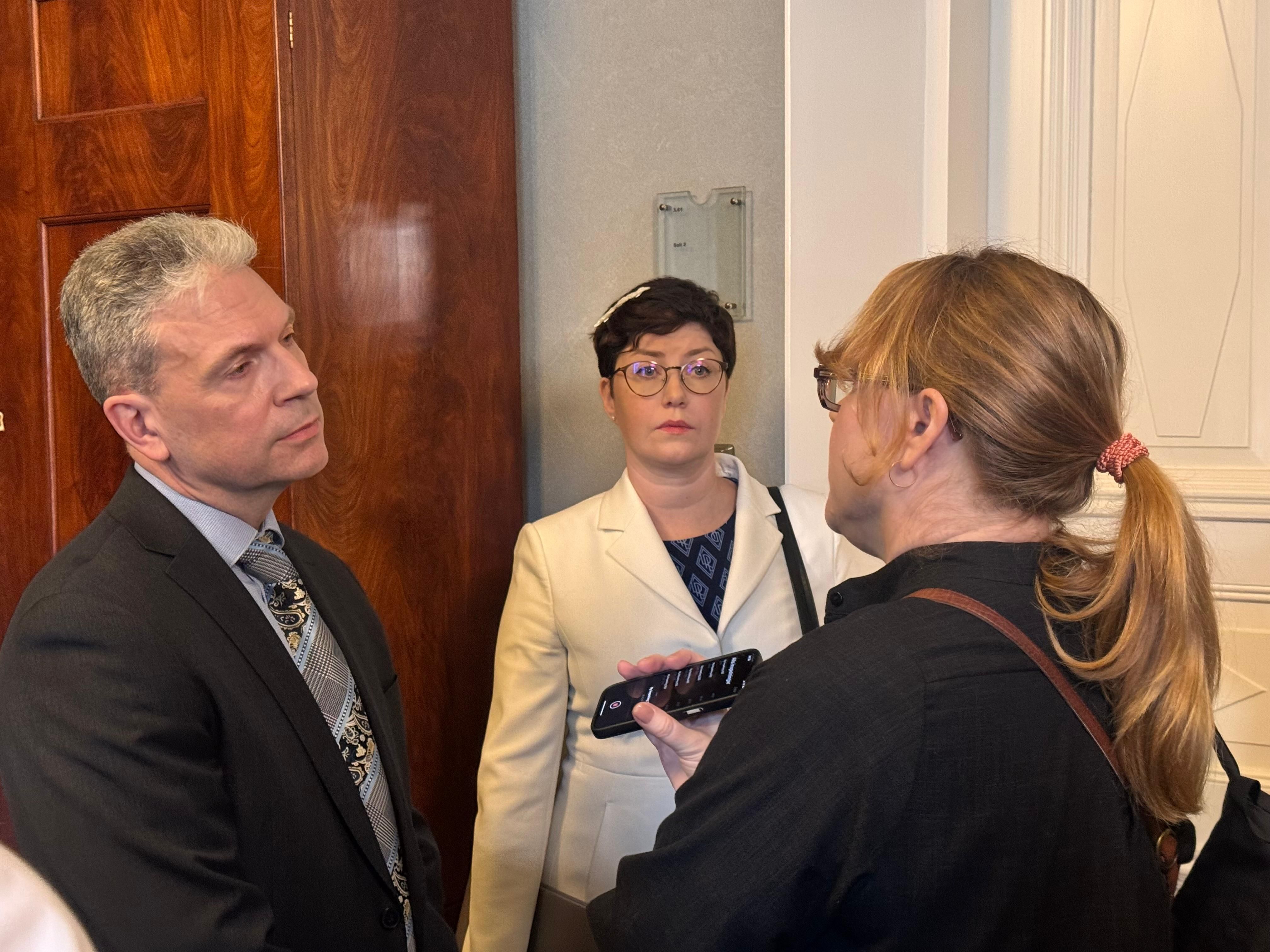
Päivi Räsänen arrives at the court
Surrounded by the press, MP Päivi Räsänen arrives.
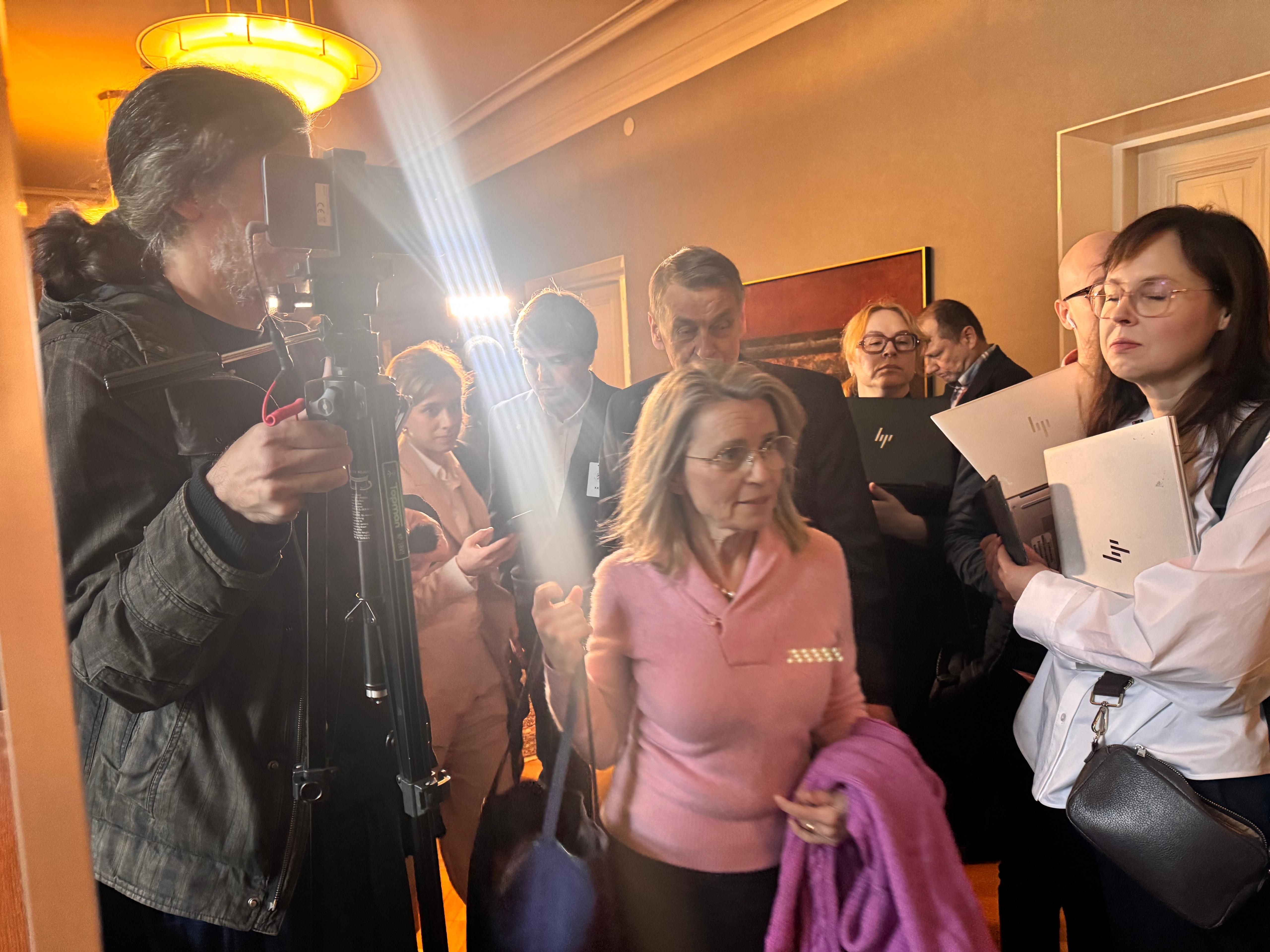
Small demonstration at the court
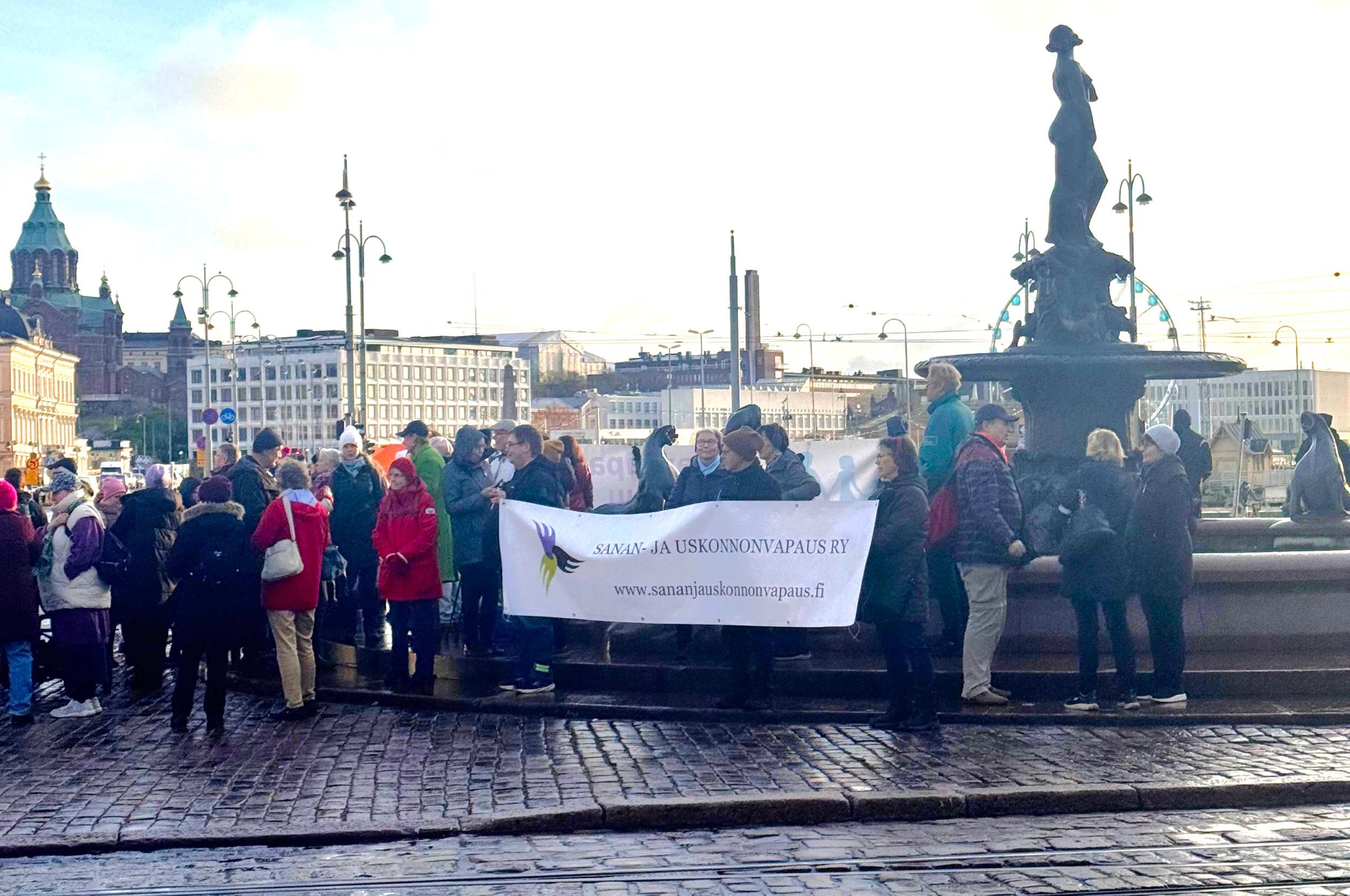
Supporters gathered at Kauppatori square holding signs reading "Right to Speak – Freedom to Believe”, in the support of Päivi Räsänen and the Lutheran bishop Juhana Pohjola.
Räsänen prepares for the trial
Read Räsänen's own story about her preparations for the trial:
In a press release on Wednesday evening, Räsänen says that she goes to the court "with a calm and confident mind". She even sees it as an honour to defend the freedoms of expression and religion.
"The upcoming decision will set a precedent for the freedom of Christians to uphold the teachings of the Bible", she writes. "It is downright confusing that I have had to defend my views rooted in classical Christianity, both in police interrogations as well as in court hearings. I am happy to talk about the teachings of Jesus, but in a state based on the rule of law, no-one should be charged for having a “wrong” interpretation of the Bible or be pressured to give up their stance."
What was this case about?
Read here our reconstruction of the court case:
Listen to a podcast about the trial:
Related Articles



